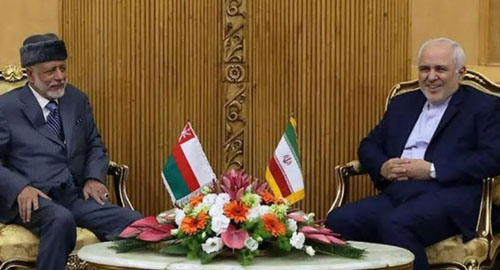by WorldTribune Staff, July 28, 2019
Iranian officials over the weekend met with representatives of several nations who have the Trump administration’s ear.
The meetings followed comments on July 24 by Iranian President Hassan Rouhani who hinted that Iran was open to indirect talks with the United States over its nuclear program and U.S.-imposed sanctions against Teheran.

Pressure has been building on Iran from punishing and growing international sanctions and from mounting economic woes and domestic unrest.
In recent weeks, in response to that pressure, Iran broke past the 2015 nuclear deal limits on its stockpile of low-enriched uranium.
As tensions mounted with Washington, Iran also began enriching uranium past the deal’s 3.67 percent limit to 4.5 percent.
On July 27, Iranian Foreign Minister Mohammad Javad Zarif met with Omani Foreign Minister Yusuf bin Alawi.
Oman is a neutral country “that in the past has acted as a facilitator of talks between Teheran and Washington,” Radio Free Europe/Radio Liberty (RFE/RL) reported.
Oman in the past has initiated mediation efforts and has said it was working “with other parties” to ease tensions between Iran and the U.S.
“There is a danger that a war breaks out, hurting the whole world,” Alawi was quoted as saying in an Arab-language newspaper interview in May. “Both parties — the Americans and the Iranians — are aware of the danger.”
While the Iran meeting with neutral Oman was seen by some observers as a positive sign, neither nation said that any mediation efforts are under way.
On July 28, Iranian Deputy Foreign Minister Abbas Araqchi met with representatives from Great Britain, France, Germany, Russia, and China to discuss salvaging the 2015 nuclear deal.
“The atmosphere was constructive. Discussions were good. I cannot say that we resolved everything. I can say there are lots of commitments,” Araqchi told Reuters following the July 28 meeting in Vienna with the remaining parties to the nuclear agreement.
Under the accord, known as the Joint Comprehensive Plan of Action (JCPOA), Iran promised to greatly limit its nuclear program in exchange for sanctions relief, but U.S. President Donald Trump pulled out of the deal last year and re-imposed crippling sanctions on Iran.
France, Germany, and Britain have tried to salvage the deal and “proposed a complicated financial barter system designed to provide some economic relief to Teheran,” RFE/RL reported. “However, Iranian officials have complained that the remaining parties to the deal failed to mitigate the effects of the U.S. sanctions on Iran’s oil and banking industries.”
Russia’s ambassador to international organizations in Vienna, Mikhail Ulyanov, tweeted that the Vienna talks “made it possible to discuss at length the situation around the implementation of this agreement.”
“It is obvious that U.S. sanctions negatively affect implementation of the ‘nuclear deal.’ However all participants are fully committed to it,” Ulyanov wrote.
After meeting the Omani diplomat, Zarif tweeted that the session dealt with the “effects of the U.S.’ economic terrorism on Iran; bilateral relations, regional developments & security in the Persian Gulf, the Strait of Hormuz and the Gulf of Oman.”
Later, Oman’s Alawi met with Ali Shamkhani, the secretary of Iran’s Supreme National Security Council, state-run TV said.
Shamkhani said that “some of the region’s countries have not only removed the possibility of talks because of hasty and arrogant moves and behavior, but have also made managing regional crises a serious challenge.”
Shamkhani also lambasted a British plan to form a European coalition to escort tankers in the Persian Gulf.
“Security measures for the region must use local capabilities and cooperation between regional countries, and foreign countries’ interference will achieve nothing but increase problems,” he said.
At a July 24 cabinet meeting, Rouhani said “We are fully ready for fair, legal negotiation based on respect and dignity to resolve problems, but we will not surrender under the name of negotiation.”
Rouhani appeared to be reiterating comments from earlier this month that he was willing to negotiate with the United States if it first lifts sanctions and rejoins the JCPOA.
Meanwhile, the head of Iran’s Atomic Energy Organization says the country has enriched 24 tons of uranium since the nuclear deal was signed.
The nuclear accord included a stockpile limit of 300 kilograms. However, it also permits Iran to enrich uranium and export it, as it has to Russia in past years.
Atomic Energy Organization head Ali Akbar Salehi was quoted by state TV on July 28 as saying Iran “did not enrich 300 kilograms of uranium, but enriched 24 (metric) tons of uranium,” or what is 24,000 kilograms (nearly 53,000 pounds.)
Intelligence Brief __________ Replace The Media
